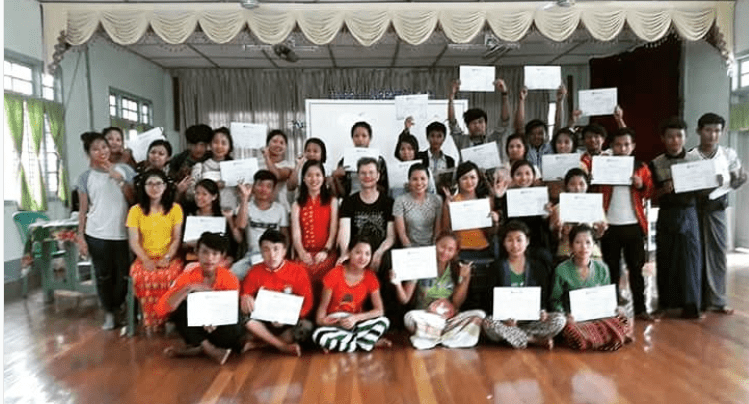Education for Peace in Embattled Myanmar
Angelika Kahlos, Civic and Peace Education Manager of Mote Oo, was interviewed by Katharine Mckenney, MBBI Writer, in September 2017.

Myanmar’s recent history includes numerous bloody civil wars, placing mediation and peace education as a key priority to those living there. Although conflict on the Western border in Rakhine State has escalated in recent weeks, other conflicts have devastated populations in Shan and Kachin States as well.
Angelika Kahlos is the Civic and Peace Education Manager for Mote Oo, a local organization based in Yangon, Myanmar with an office in Mae Sot, Thailand—a township on the Thai-Myanmar border. Mote Oo has been operating in the informal education sector for adult learners in Myanmar and bordering countries since 2013, with over 40,000 textbooks disseminated between 2013 and 2017.
Mote Oo is not a school, nor does it have its own students, says Kahlos. As part of its education for peace initiative, the organization organizes trainings of trainers, or “TOTs”.
“TOTs are offered to a wide range of target groups, including civil society trainers and teachers in the informal education sector such as monastic schools, alternative education systems in ethnic minority areas, and education in camps for internally displaced persons and refugees”, says Kahlos. These target groups proceed to share their knowledge in their respective communities, contributing to the groundwork of lasting peace in an ethnically and culturally diverse landscape.
The team at MO has developed three main textbooks for use in their peace project: “Understanding Conflict”, “Understanding Peace”, and an introductory textbook, which draws on content from both. Mote Oo’s inclusion of peace in their trainings of teachers, trainers and other educators is a response to numerous requests from Myanmar actors and partners for a “Mote Oo-style textbook” dealing with peace and conflict. Theory, comprehension exercises, experiential learning methodology, and reflection questions that encourage value development are all aspects of the Mote Oo strategy that promotes what Kahlos calls “education for peace” in Myanmar.
Kahlos states, “in education for peace, the learners gain new knowledge for sure, about peace and conflict theories and models, but they also learn practical skills, like mediation techniques, and shape new values, like tolerance of differences.”
Teachers and trainers then become models their communities can look to for “peacebuilder behaviour”. What, exactly, does a good peacebuilder look like?
“The person has to have good communication skills, resolve conflicts and disagreements peacefully and in a non-violent way, be willing and interested in listening to perspectives and experiences other than their own, and strive to meet others’ needs,” says Kahlos. “Education for peace isn’t education for peace if there isn’t any transformative element.”
Anyone interested in these books can download them for free from the Mote Oo website, buy a hard copy at the Mote Oo Yangon office, at selected book shops in Myanmar, book stalls/booths at different events, or place an order via the website.
Photo caption: Youth Leadership in Peace Building Training KMSS Myitkyina (Youth Participants)
Trainers: Mote Oo Education, Peace Team
